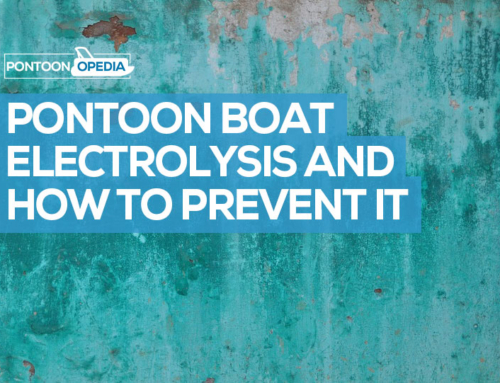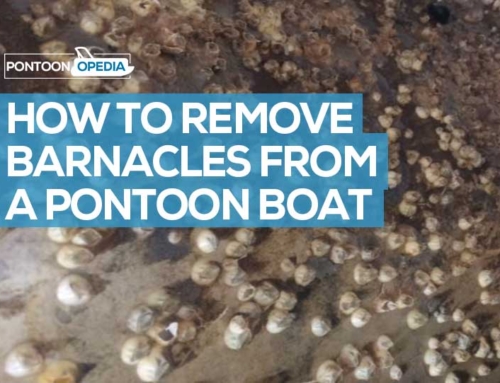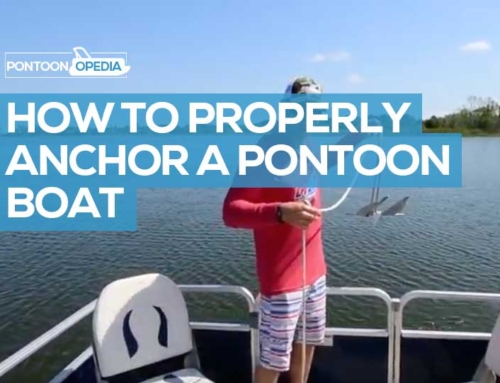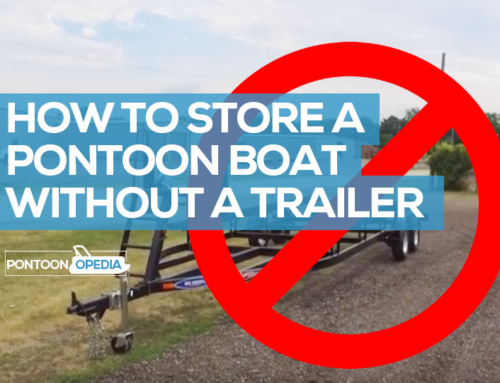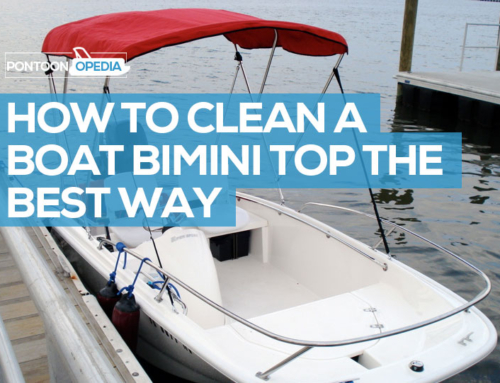Last summer I left my pontoon boat moored up at our local dock for 3 weeks whilst my family and I went away on holiday. The boat was secure, it was tied up and moored correctly, and as far as I was concerned in a safe location.
However, when I came back from holiday, went down to the water and stepped on board our Bennington I knew I had a problem. Seeing foam and vinyl torn up all over the deck, I knew I had a rat invasion.
Rats had got in. But how?
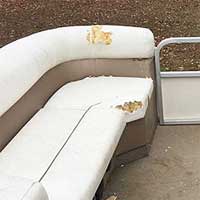
Rodents can do a lot of damage.
They had climbed up the mooring lines, got under the cover, and had a rat party. My vinyl seats were destroyed, there was rat dropping and faeces everywhere, a nest under the console and they had even chewed through wiring.
I did manage to get rid of the rats on my boat, but it wasn’t a cheap or easy clean-up operation.
In this guide I am going to tell you how you can keep rats off your boat in the first place or get rid of any rodents that have already made their home.
There are two distinct scenarios on how this can happen.
- Your boat is docked up in the water and rats get on via mooring lines
- Your boat is stored at home or on land under a cover
Let’s take a look at both scenarios, with my tips that I now use successfully to keep rats off my boat, and also how I got rid of the initial rat problem after it happened.
Table of Contents
How to Keep Rats Off Your Boat When Docked
This is what happened to me, and it can end up being a very expensive problem. Rats coming onto my pontoon boat cost me in excess of $1,000 to get everything fixed up, and lower down the page I will tell you how I got rid of them completely.
But first let’s look at the preventative measures first that I wish I had taken or known beforehand.
The most common way in for rodents is by climbing up either your mooring lines, or via overhead utility cables. You might hear of rats being up to jump from the dock side on a boat, but I’ve personally never seen that happen.
Other ways in which rats can get onto your boat is by boarding ladders. There are some water rats that are very adept at climbing ladders, or even by coming up any loose fender lines that might be hanging into the water.
Here’s what you need to do to keep rats off your boat to make it rodent proof when docked.
1. Install Rat Guards on Mooring Lines
Mooring lines will be the number one route of entry for rats who want to get on your boat. They are like commandos, and that’s exactly how they got onto my pontoon.
Rat Guards are relatively cheap and very simple to install (view Rat Guards on Amazon), and clip over the mooring line securely creating a barrier that rats cannot breach.
2. Install Rat Guards on Overhead Utility Lines
Rat guards can also be used on overhead utility lines in the same way that you attach them to mooring lines. If your boat is moored under a covered slip, buy some more guards and attached them there too.
Rats will climb and drop onto the boat from above like ninjas. I’ve seen it happen at my local marina, and it’s quite a hideous sight!
3. Identify Points of Entry & Block Off
If you have any fender lines or other items that are hanging off your boat into or near the water surface, then get those back into the boat. Rats can and will climb and are very adept at spotting weaknesses.
Holes on the boat’s side should also be filled with wire wool, as rats can’t chew through this stuff. It’s virtually rat-proof so stock up some and start filling those holes or gaps.
4. Pull Boarding and Dive Ladders Back into the Boat
If possible, pull your boarding and dive ladders into the boat.
If you can’t do that, think of a way in which you can create an overhanging structure on one of the ladder steps, so the rat or rodent can’t physically pull themselves up and over.
How to Keep Rats Off Your Boat When in Storage
Your boat is most at risk from rats climbing on board when it’s out of the water, with many a heart broken boat owner taking their cover off after winter, only to see a destroyed boat interior.
When on land, there are multiple entry points that rats and rodents can take advantage of. That makes your job in keeping them off is much harder, but it can done successfully with some simple hacks.
1. Block Off Any Entrances
The most important aspect is to block any holes or gaps off.
As with my earlier comment, they can’t chew through wire wool, but I would stop them even getting to that hole before they even have a chance to, and I do that using snap traps.
2. Set Up Snap Traps Under the Trailer
You might want a more humane approach, and there are ethical traps available. For me, I don’t want rats coming back or nesting anywhere near my house; snap traps that kill are the best solution.
These are the snap traps I use from Amazon. Place them strategically at the base and top of your trailer tires and you will prevent rats from getting on your boat.
3. Fit Bright Solar Lights to Shine Under Your Boat
Rats and mice hate bright lights. By wrapping some bright solar lights around your trailer bases you can deter them from trying to climb up into your boat.
The simplest way to do this rather than buying expensive lighting systems, would be to just use some solar light roping (view on Amazon).
These are the same rope lights you might put up in your garden or on a patio for decorative purposes.
4. Use Moth Balls or Rodent Repellent
For some reason moth balls are like kryptonite to rats and mice. They hate the stuff.
Sprinkle the moth balls in around the deck floor on the boat, and it should, in theory, keep rats off or even get rid of them completely.
You might also want to look at using specialist rodent repellent spray. It smells much nicer than moth balls and won’t harm them either.
How to Get Rid of Rats on Boat Once Nested
But what if you have rats already on your boat, and you need to get rid of them? I feel your pain, and this is where my own personal experiences can help.
How I got rid of the rats on my pontoon boat was a hard task and took me a couple of days until I was completely certain that they were all gone. Here’s what I did.
1. Set Up Traps on the Boat
I didn’t really want to kill the rats, but after seeing how much damage they had done, any slight feeling of ethics I had went out of the window. My recommended snap traps are featured higher up the page, but for a more humane solution, you can get live traps.
The ones that seem to have the best reviews on Amazon are from a brand called AB Traps, and I know other pontoon owners who have used these to get rid of rats on their boat successfully.
The traps will need to be placed near the food they have been eating, or the area where you see evidence of most rat activity.
Before placing traps down in the boat, get rid of any food on board, or garbage.
You want the rats to get hungry, with their only source of food to be the bait inside of your trap. And honestly, cheese really is the best thing!
2. Put Down Rat Poison
I used poison as well as traps, but this does come with a word of warning.
If you poison a rat on your boat, they will find somewhere dark and hidden to spend their final hours. That means you could be left with trying to find the corpses which will make more clean-up work for yourself.

Poison works, but you could make more work for yourself.
Nothing smells worse than a dead rat, especially once the sun starts beating down and things start to warm up.
I ended up having to remove part of the console in my pontoon boat’s helm, and then had the really nasty job of cleaning up decomposed mother rats and babies. There was gunk all over the wiring and in corners that took forever to clean out completely.
3. Get a Mouser Cat
I know a boat owner who has a cat purely to keep rats away from his boat. You might not want to actually own a cat yourself, so ask around to see if any friends you know own cat that is an effective mouser.

Tiddles might look cute, but she is a trained killer.
The cat will need access to the whole boat so make sure that no rooms or lockers on the boat are locked up. Rats and mice will hide themselves very well, but a cat will soon sniff them out and plan its attack.
I didn’t use a cat for this purpose, but we do have a cat at home who regularly prowls around our garage so gives me the peace of mind I need.
The Clean-Up Operation
Once I had got rid of the rats on my boat, I had the final task, which was the clean-up operation. This is probably the hardest part of all once you have removed rats, as they leave a heck of a mess behind.
1. Cleaning Up Rat Droppings
The key here is not to use a vacuum cleaner to suck up the rat droppings. If you do this, you could place your health at risk at it can pump harmful bacteria into the air.
Instead you should use a sweep brush and pan and dispose of them carefully. Rat dropping can carry diseases such as salmonella and other nasties.
Always wear rubber gloves and use a spray bleach solution after the clean-up.
2. Dispose of Any Boat Food
The reason you had to get rids of rats on your boat in the first place was because it was a nice and warm place to nest, but also due to food on board, including and bits of debris they found.
Food stored on your boat is now very likely to be contaminated, so get rid of it completely. Throw everything out, and I would even include any plastic storage boxes as well to have complete peace of mind.
3. Test Boat Wiring and Electrics
The rats on my Bennington pontoon boat chewed through wiring, not just my seats. There is something about electrical insulation rodents love, and chances are you’ve got a repair job to do.
Thankfully that shouldn’t be as expensive as replacing upholstery, but it’s still going to be a big job.
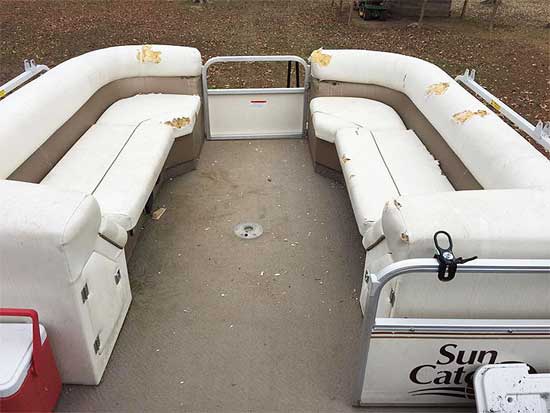
Vinyl boats seats will be completely destroyed by rodents, and will be expensive to replace.
It’s important that all wiring is checked for safety. Faulty and damaged wired can lead to an electrical fire, so if you aren’t handy with electrics, get a qualified electrician on board to fix and then do the checks for you.
4. Keep the Traps Out
Hopefully you have got rid of all the rats, but there could be some still hidden on board that you haven’t managed to remove during the first phase.
Keep your traps out for a few days and monitor the situation.
If you see one rat on your boat, it’s almost 100% guaranteed that there are going to be more. And it’s the pregnant ones who are nested and hidden that are going to be present the biggest problem down the line.
Conclusion
Prevention is far better than cure.
If I had known how to keep rats off my boat last summer, I would have saved myself over a thousand dollars’ worth of damage.
Even if you don’t think it could happen to you, it might well do, so please take the advice laid out above before it’s too late.
Handy Hint: I have also written a guide on how to stop other critters including mice and smaller rodents from nesting in your boat over the winter.





